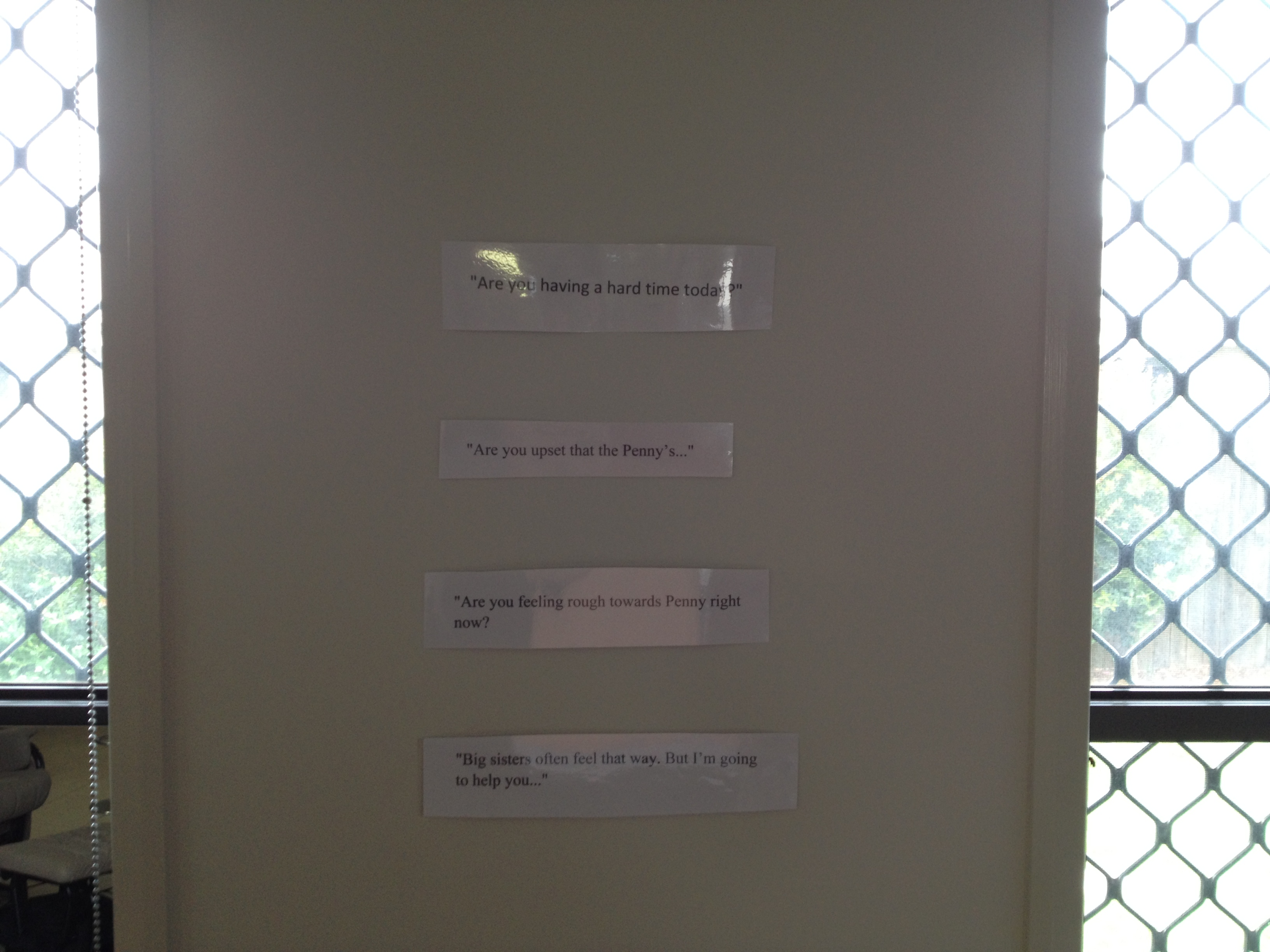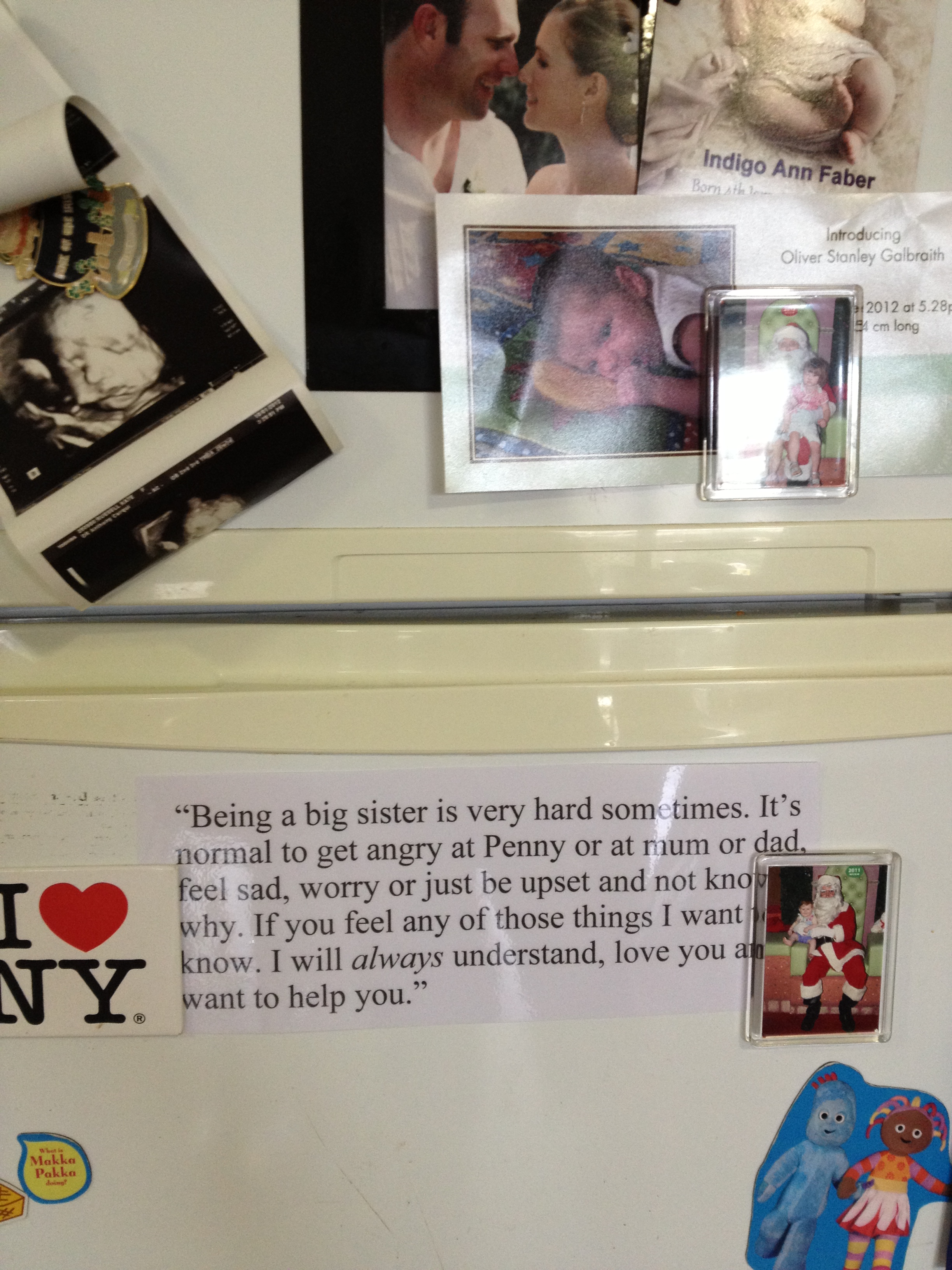From the time I first discovered RIE to now, I have gone through many anxious moments as a parent. As I have read articles highlighting the ways RIE should be approached in my day to day life, it has been, at times, overwhelming and has made me feel like I have too much to change all at once. At first I found that not a lot came naturally to me. It took a lot of conscious thought on my part to change not only my actions but my wording, my temperament and my tone. It was especially hard for my husband who, although supportive of the approach, did not invest as much of his time into reading and researching it as I did. And also, being a full time worker, he was not always home as I was to practice how to approach the situations as they arose.
It has been roughly 10 months since we adopted the RIE parenting approach and still we are both slowly learning to make it an autonomous skill in our house. We have tried to take it one step at a time, choosing one RIE practice to focus on before changing to another. There were some that came quite easily like allowing developmental milestones to occur naturally and changing the types of toys we had but others required (and still require) much more daily thought and a complete shift in what we had instinctually been doing. Discipline and managing emotions has been one of the most difficult for us to become comfortable with. There are still many times on a daily basis that even I find myself scrambling for words to say to my two year old who has just muscled into my one year old’s position for the third time in 10 minutes, causing her to fall to the ground followed quickly by one child crying and then the other. I know it is important, not only for us, but for our children that we are consistent in our approach to this type of situation so that they feel confident in us as their primary carers and can be secure in the knowledge that we stop them from having this type of power.
I was also finding myself getting frustrated at my husband who regularly used different ways to handle the situations and often I couldn’t stop myself correcting him in front of the children. Not wanting to have the kids see this type of conflict in the house and wanting to have some help finding helpful words at those critical moments, we have decided to put a few pertinent phrases up around the house so we both can refer to them as needed.
In particular, I have focused on phrases we can use when rough situations arise between the girls as this is what is dominating our household at the moment. They have only been up for one day and already they have made a big difference. I feel I can now confidently speak to the children with these words after only a quick reminding glance at the phrases. I had initially thought they would go on the fridge but I quickly realised that they needed to be where the problems were occurring and for us that is mainly in the play area.

Phrases read:
“Are you having a hard time today?”
“Are you upset that Penny’s…?”
“Are you feeling rough towards Penny right now?”
“Big sisters often feel that way. But I’m going to help you…”
Most of these phrases have come from Janet Lansbury’s post, Helping Kids Adjust to Life With the New Baby. I have read and reread this post several times but could never seem to get the phrases to stick in my head to use when I needed to. Now that they are up to refer to, both my husband and I can finally use them more consistently.
The only quote that went on the fridge was a long quote. Janet suggests talking regularly to the older child about how it can be difficult being an older sister. This way they continue to get a sense of your unwavering support and understanding of their predicament. I have placed the quote on the fridge and although wordy, I intend to use it as a reminder to talk to my eldest daughter about her feelings rather than to read it to her word for word.

Quote reads:
“Being a big sister is very hard sometimes. It’s normal to get angry at Penny or at Mum or Dad, feel sad, worried or just be upset and not know why. If you feel any of those things, I want to know. I will always understand and love you and want to help you.”
What things have you done in your household to help create a united front and consistency when using the RIE approach?


Thank you so much for this post – it’s really exactly what I needed. I totally identify with the whole “husband who supports the idea but hasn’t read up on it” thing – so hard to keep my mouth shut when I would have dealt with a situation differently. Thanks heaps for the quotes around the house idea – I’ll be implementing it straight away, as I’ve also had trouble internalising Janet’s fantastic advice in that post regarding rough feelings from a big brother.
Hi Hannah. I’m really pleased the post could help you. Yes, husbands try hard but I don’t think they will ever be able to fully internalise the RIE methods unless they take it upon themselves to do their own reading. I don’t expect my husband to do this as he works full time so the notes on the wall have been really great for him to easily refer to. in fact, they have been useful for us both this week. Not once have I felt lost for words like I often did in the past and I am hearing my husband use the phrases more frequently too. All the best with it. Let me know how you get on. Kate xx
We had quotes around the house for quite a while too. They really were such a sanity saver in the heat of the moment when calm words failed me. I also have example dialogues written on those lined cardboard address cards; one for tantrums, one for sharing, that sort of thing. I keep them with me and refer to them a lot. It’s true, this type of parenting doesn’t always come naturally. It’s ongoing dedication but so very worth it. Imagine what would happen if just one generation raised their children peacefully?
Hi Kate, I think I remember you telling me this once before, now that I read this. Not sure why I didn’t cotton on to it then. It must have been in my early days of RIE. I like the idea of dialogues for different situations to take along with me. I am going to try that next. What a wonderful world it would be if our kid’s generation were all respected and brought up peacefully. If only… *sigh. Xx
Thank you for including my post in your page. This is a great article and I shall be looking at it a lot. 🙂
Thank you for your great RIE article. :))
Pingback: Could NOT forcing a toddler to share help with sharing conflicts? | Peaceful Parents, Confident Kids Blog
oh! i really love this. that last line in the paragraph on your fridge for big sister.. so powerful. to express (and remind) that we are here to help them. i’m going to start using this!!!
Lina, I cant tell you how much having these phrases up has helped us here. You have reminded me that I really need to review and update based on new issues that now dominate our household. I find having cues around is a bit like having a coach encouraging me to stay calm in those pressure moments. It really does work too. Lucy will now often come to me saying things like ‘I’m feeling a bit rough’ or ‘I’m a little bit sad, I need some help’.
Hi Kate,
This is a great post, I really needed it. I’m the only “RIE” for the moment. We both agree on respectful parenting that’s for sure. No hitting, no shaming – that’s our goal! but our ways are different.
I too, read, read, read, and read some more. the “I won’t let you…” has been implemented already for almost 6 months (before i discovered RIE), it came from our national super nanny.
I started with 2 important things, which are truly new for me: acknowledging feelings and speak/explain before doing something for my child or to her. Those are the 1st things that came to my mind to implement right away because those are involving her directly.
I have a lot of issues with the wording, i really do – both because of the translation and mostly because it doesn’t come naturally. I’m using a lot “I see that you’re… I understand that you’re…” and struggle to finish those sentences correctly.
I know i have to change the “good girl”, “good job” wording – but 1 struggle at a time 🙂
I keep telling my husband that this works and this is the way to go in my opinion. I find myself correcting him a lot… i really need to stop that. He reads too, but other stuff, i guess RIE doesn’t exist in Hebrew, he didn’t bump to it like i did from blogs to blogs to blogs… so now, i realized that he often distract to get something done – which by the way, makes me proud of myself in a way.
If you have any advice on that too, i’d love to hear them.
Thank for writing your journey, it’s just exactly what i needed ♥
The acknowledging feelings things is such a huge step forward with your children. I say things like. “I can see you are angry that I wont let you have a cookie. It can be hard when you can’t have what you want. It is normal to feel that way.”
With the good girl, good job phrasing, either thank them for doing something you wanted them to do or change it to sportscast what you see happen. Eg if the child puts their scraps in the bin, instead of good girl, simply say ‘thank you’. If they achieve something they are proud of you can say “You did it” or “You made it to the top. You must be very proud of yourself.”
Once acknowledging feelings becomes second nature, your husband will have no more need to distract to get something done.
Does that help? Let me know if you’d like some more ideas.
Thanks Kate.
Hi,
I just found out your blog and thanks for all your great advices.
I didn’t know RIE until yesterday and since I can’t stop reading your posts.
My little girl is 8 month old and I hope it’s never too late to start RIE parenting. Now I have to convince my husband that it’s the best thing to do for her and us.
I will surely ask you a lot of advices in the next months.
Thanks !
PS : Sorry for my english, I’m french 😉
Hi Audrey,
It’s lovely to have you here. It is never too late to start RIE parenting! My eldest was 18 months and my youngest 7 months when I started and it truly changed our lives.
Please feel free to ask me anything you like as I am more than happy to help out if I can.
All the best with it and I can’t wait to hear how it all goes for you and your family 🙂
Kate xx
Oh my. I stumbled across RIE just a week ago, on a post by Janet about- I know Why You are Yelling. And it basically summed up my life. I have four kids, 4.5, 2.5, 2.5, and 1. They are incredible but all have these strong personalities. I feel like I spend all day long dealing with them fighting. Which is normal, yes, but I was at a loss as to how to deal with it. I had become the parent I didn’t want to be- threatening with punishment, counting to three, raising my voice, being so impatient at all the little tiny things that made them cry. I had a hit a major wall and did not even want to be here, didn’t want to do this job that I treasure so much. Plain and simple, I did not respect my kids, but saw them as needy burdens who took everything from me. I finally realized that they weren’t the problem, but my attitude, my perspective was. They still need a lot but now I see that I can not expect them to respect me and our relationship if I don’t respect them as whole people.Which doesn’t mean letting them walk all over me, boundaries are important and essential in a household of six, but it does mean that when they cry over something I think is silly, I no longer wave it off. Some of the practices I already do (open-ended toys, natural physical developments- as I have taught preschool and studied child development). I have to say though, I am overwhelmed. It is so much to change, so many habits to unbreak. At the end of the day, I am completely mentally done. It takes every bit of my energy and patience to focus on my language and my emotions. Most of what I have come across with Janet’s blog are more single child, baby focused lesson. With some on toddlers sharing in playgroup settings. But in a home setting, with children so close in age, I wasn’t sure how to handle the CONSTANT conflict. It was nice to hear that I’m not the only one feeling that. Do you have any other resources for implementing RIE newly, in a baby, toddler, elementary household? How open-ended do my toys need to be when I have a kindergartner (whom we are homeschooling)? How do I balance that multi-age when using these techniques? Thank you so much for this post!!
Wow, Mcbabybump, your words have given me goose bumps and made me all emotional. With less children, your story is nearly identical to mine. I was so overwhelmed and guilt ridden when I started reading Janet’s articles. As I read, I realised I was pretty much doing EVERYTHING wrong. My instincts had failed me and I had to untrain and retrain. I wanted to get it right overnight because I could see the detrimental impact my instincts were having on my children. It was so hard. Now, nearly two years on I still don’t have it right and although my actions and words are now more inline with the RIE philosophies, I still have to fight my instincts often and work hard to stay mindful and respectful of my children.
I don’t mean to sound discouraging, I hope to make you realise that 1. It is never too late to change 2. It is hard so don’t be hard on yourself if you don’t get it right all the time 3. Your children are very forgiving and will appreciate you making this effort in the long run.
Making it work in your household is firstly about your mindset and increasing your understanding of what being a respectful parent means. The best way to do this is to read. Think of it like a uni degree. Take notes, test yourself (on the children), evaluate your progress etc. When you read about a new technique, write it down in a list with all the other things you want to change. New approaches, new ways of wording things. Write them all down together but choose just one to focus on for a few days. It takes 3 days to break a habit and another 3 days to form one so if you persist with something for a week you should find it start to come a little more naturally to you and then you can start on something else.
With regards to toys, the less you have, the better. Can you create a space for your elementary age child where there are some more advanced or learning specific toys available for them but that the other children don’t have access to. Open ended are best for encouraging creative play, problem solving etc but that doesn’t mean you cant have other toys that do have specific play purposes. One thing we did was to get rid of any toy that needed a battery. A toy that talks, lights up, moves etc is more stimulating than children need. When they have electronic toys that do the work of play for them, they no longer need to think about how to play but learn to follow the lead of the toy. It also means that toys that require effort (ie passive toys like blocks) often get overlooked for toys that are more exciting. it was the best thing we ever did. Take a look at http://www.aneverydaystory.com. My friend Kate, homeschools her children and has the perfect collection of toys. I think you will find her blog very inspiring!
Please don’t hesitate to ask more questions along the way. I am more than happy to try to guide you if I can.
All the best
Kate xx
Pingback: RIE: It's all about Perspective - Peaceful Parents, Confident Kids